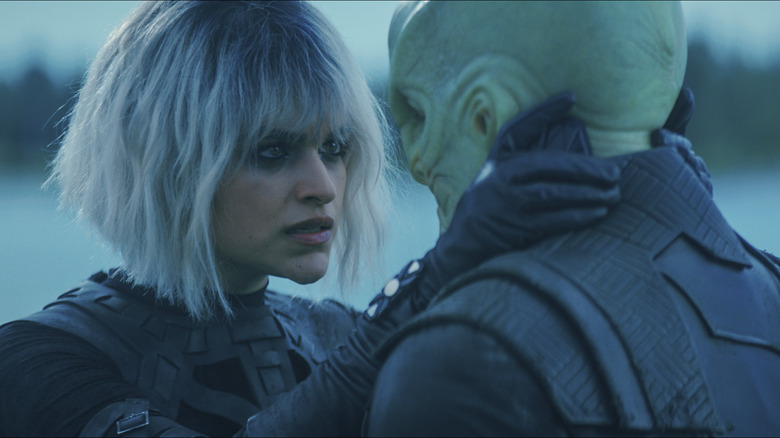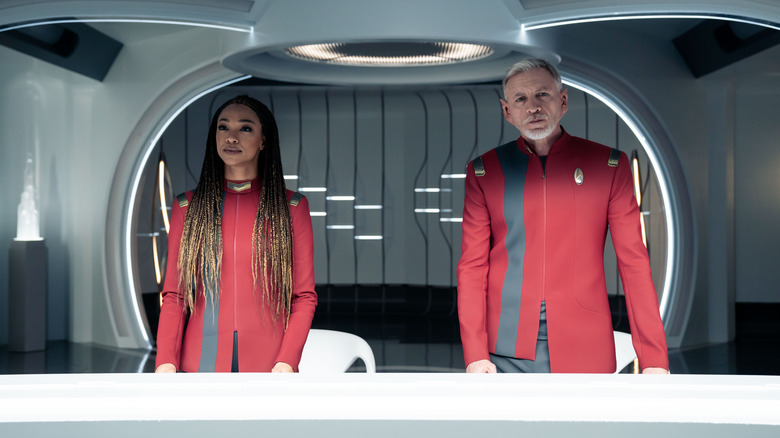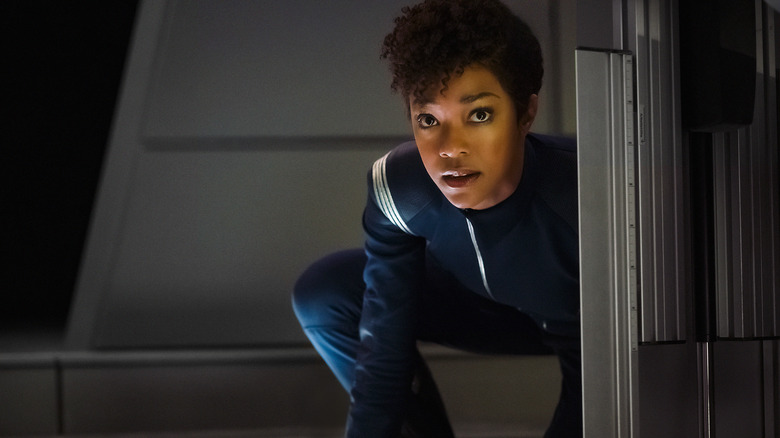Star Trek: Discovery Just Brought Back Two Classic TV Tropes
This article contains spoilers for the latest episode of "Star Trek: Discovery."
For many Trekkies, "Star Trek: Discovery" has always felt a little like the younger brother clinging onto the franchise's back. The sky-high stakes that always seem to threaten the universe, the heavily serialized nature from episode to episode, and even the way these heart-on-their-sleeve characters carry themselves throughout their duties ("...like best buds at a slumber party," as /Film's Jacob Hall put it succinctly in his review for the season 5 premiere) has all but screamed the fact that this show was meant for younger, more modern audiences.
So imagine our surprise when episode 4 of this final season suddenly dipped into its bag of tricks to unleash not one, but two classic examples of TV tropes that hearken back to the days of "The Original Series." The "time bug" kicks everything off, catching Captain Michael Burnham (Sonequa Martin-Green) and Commander Rayner (Callum Keith Rennie) in the most quintessential of Trekkian problems: a time loop. Although not unfamiliar territory for our heroes — this isn't even the first time "Discovery" has gone back to this well, as season 1's "Magic to Make the Sanest Man Go Mad" deals with similar temporal shenanigans — what does make this episode stand apart is the fact that this plot serves two important purposes.
For one thing, it allows the writers to reuse a handful of the exact same interior sets of the USS Discovery for practically the entire hour, making this a bottle episode. Secondly, when Burnham travels back in time and re-experiences previous events in the show's history all over again, it's kind of like a Trekkian twist on the idea of a clip show. Together, "Face the Strange" becomes one of the show's quirkiest episodes yet.
Starship in a bottle
Is that a bottle in your episode, or are you just happy to see me? Okay, that wasn't the smoothest segue I've ever written but, much like the lesson learned by Burnham and Rayner by the end of this week's episode of "Discovery," a rough start doesn't necessarily have to be the final word. The pair discovers this the hard way in what essentially turns out to be an homage to a tried-and-true television trope.
Originally conceived as a measure to cut corners and save money when a season ran the risk of going over budget, bottle episodes have always been a win-win situation for everyone involved. The producers and studio bean counters, naturally, will be happy with anything that saves them a tough conversation with the bosses. And although fans these days typically look at constraints as an unequivocal disadvantage for artists, there's actually something freeing about the process where writers are forced to come up with unique scenarios and creative storylines by thinking outside the box — simply to justify using only the same few sets, a handful of actors, and a less extravagant vision.
For instance, a typical episode of "Discovery" tends to involve away missions to far-flung locales, space battles with enemy ships firing lasers, and all sorts of VFX-dominated mayhem. This time around, however, all of the action (outside of the opening few minutes, that is) takes place entirely within the confines of the USS Discovery ... and constantly in the exact same rooms and hallways, too. The Captain's ready room gets a steady workout, as does Paul Stamets' (Anthony Rapp) place in Engineering. Otherwise, we really only ever return to generic hallways, the elevator, and the bridge. Yet despite the small scale, "Discovery" embarks on its most high-concept adventure yet.
Highlight reel
Oh, we're taking things all the way back to the beginning. With the news that the fifth season of "Discovery" would also be its last, it stood to reason that showrunners Akiva Goldsman and Michelle Paradise would take a victory lap of sorts while also treating longtime viewers to a bit of a nostalgia tour. Episode 4 killed both birds with one stone by incorporating the other trick up its sleeve: putting its own sci-fi stamp on the clip-show episode.
Although a rarity in recent years, those of us who grew up on sitcoms know all too well the joys (and, to be frank, the cringe) of the clip show — an even more extreme example of cutting costs by literally just re-airing old footage. Thankfully, "Discovery" adds a fresh wrinkle to this trope. Rather than hit pause on the ongoing plot and bring things to a screeching halt for a hackneyed trip down memory lane, the writing team instead makes this the entire point of Burnham's arc in the episode. First, the time loop forces her to relive several major events from seasons past, along with certain ones that she wasn't actually present to witness firsthand. She experiences the Discovery crew's perspective of traveling through the wormhole in the season 3 premiere and ending up far in the future, their desperate battle against the artificial intelligence Control in season 2, and even a fight against her own younger version from season 1.
"Discovery" could've easily settled for channeling its inner "Groundhog Day" or, more relevantly, the time-travel hijinks of "The Constant" episode from "Lost," but instead we receive a mini-highlight reel reminding us of everything this crew has survived together. It doesn't get much more "Trek" than that.
New episodes of "Discovery" stream on Paramount+ every Thursday.


